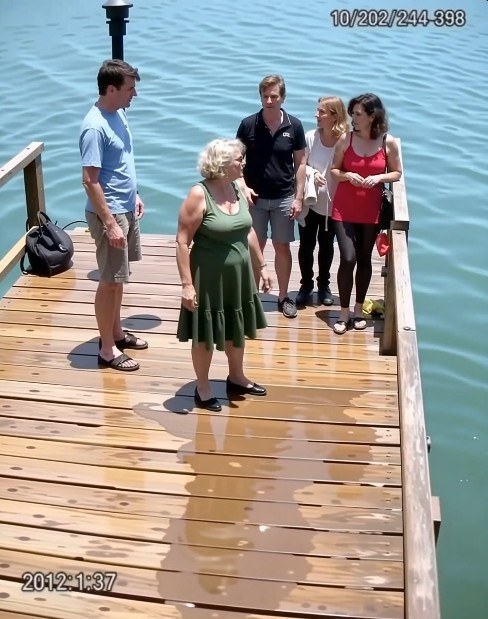My grandson pushed me into the lake during a family outing, and he laughed as I struggled to stay afloat, the cold water biting into my skin. The shock of the fall stole my breath, but what hurt far more than the chill was the laughter ringing in my ears. “Don’t be so dramatic,” my daughter-in-law said with a smirk, standing at the shore as if watching a performance. In that moment, the coldness of their hearts cut deeper than the lake ever could. They treated me as though I were a fragile, incapable old woman who depended entirely on them, forgetting the decades I had spent building a life from nothing alongside my late husband. That disrespect, that thoughtlessness, opened my eyes—not to their power, but to the strength that had been mine all along.
In the days that followed, I allowed them to believe that I was forgetful and frail. I let the whispers continue, about sending me to a care facility, about how I had become a burden to the family. I wore their assumptions like a cloak, letting it mask my awareness. But inside, I was observing. Every word, every glance, every smirk—I cataloged it quietly, noting patterns and intentions. I documented their actions, not for vengeance, but for self-preservation. For years, they had assumed I would never see the cracks in their behavior, that I would quietly accept whatever indignities they chose to inflict. They underestimated me.
Behind the facade of weakness, I had already secured my independence. My financial foundation was strong, placed in a trust I had carefully constructed to protect my future. It was designed not for revenge, but to reward those who truly valued integrity, kindness, and respect. They had no idea I had planned for a life where I could walk away from anyone who failed to honor me.
The day they discovered my bank accounts were empty, their arrogance gave way to panic. Their confidence shattered in an instant. The very people who had treated me with mockery and disdain were forced to confront the reality that I was not at their mercy. In a frantic attempt to regain control, they reported me missing, convinced I would be lost without them. But I had no intention of disappearing; I simply chose to step away, seeking counsel from trusted advisors and professionals who recognized my value and my rights.
In sharing my experience with those I could trust, I was not seeking revenge. I was claiming my life back, ensuring that I would never again be at the mercy of those who lacked empathy or decency. Every insult, every attempt at control, had been transformed into a lesson in strength. What they intended as humiliation became my liberation. I realized that my power was not in fighting them with cruelty, but in walking away with my dignity intact.
Now, I live in a peaceful senior community where kindness and respect are the norm, not the exception. My days are filled with meaningful connections—laughing with friends over shared stories, offering guidance to younger generations, and mentoring those who understand the value of elders. I have rebuilt my life not on bitterness, but on a deep, quiet strength that only comes from experience and self-respect.
People often mistake gentleness for weakness, assuming that a soft voice or a calm demeanor indicates vulnerability. But I have learned that true power lies in knowing your worth, in protecting yourself, and in choosing peace over anger. The strength to walk away, to leave toxicity behind, to live fully on your own terms—this is the real measure of resilience.
In the end, I did not respond to their cruelty with cruelty. I did not seek to humiliate or punish them. I simply reclaimed my life, one careful step at a time, and built happiness surrounded by respect, dignity, and genuine human connection. My story is not about what was taken from me—it is about what I found in myself: courage, clarity, and a life worth living on my own terms.
